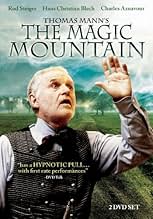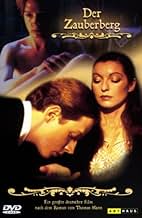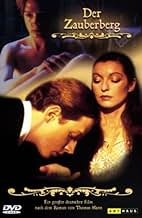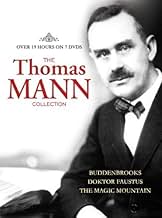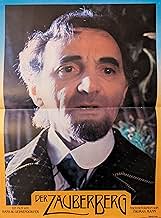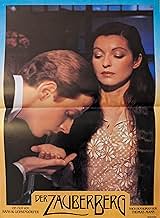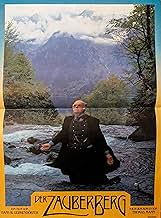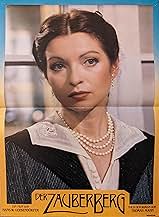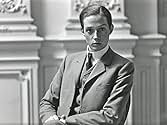Adicionar um enredo no seu idiomaHans Castorp, fresh from university and about to become a civil engineer, comes to the Sanatorium Berghof in the Swiss Alps to visit his cousin Joachim, an army officer, who is recovering th... Ler tudoHans Castorp, fresh from university and about to become a civil engineer, comes to the Sanatorium Berghof in the Swiss Alps to visit his cousin Joachim, an army officer, who is recovering there from tuberculosis. Intending to remain at the Berghof for three weeks, Hans is gradual... Ler tudoHans Castorp, fresh from university and about to become a civil engineer, comes to the Sanatorium Berghof in the Swiss Alps to visit his cousin Joachim, an army officer, who is recovering there from tuberculosis. Intending to remain at the Berghof for three weeks, Hans is gradually contaminated by the morbid atmosphere pervading the place. Wishing very much to be cons... Ler tudo
- Direção
- Roteiristas
- Artistas
- Prêmios
- 3 vitórias no total
- Narrator
- (narração)
- Direção
- Roteiristas
- Elenco e equipe completos
- Produção, bilheteria e muito mais no IMDbPro
Avaliações em destaque
The actors impressed me, with one exception. Christian Eichhorn was young and ardent as Castorp, Flavio Bucci extravagant and impassioned as Settembrini (just as I imagined him from the novel), and Rod Steiger tore a couple of scenes to tatters in an enjoyable way in the third and final episode. Marie-France Pisier is hardly a "listless, worm-eaten Kirghiz-eyed" woman as Mann describes her, but is always striking and lovely to look at. Only Charles Aznavour, badly miscast as Naphta, fails to impress the viewer. What were they thinking of, casting the hapless hero of Truffaut's Shoot the Pianist as a callous totalitarian philosopher?
Overall 5/10 Full review on movie-discourse.blogspot.de
Dismayingly, the Peeperkorn of Mann's novel is completely unrecognizable in the movie character. In the book, he is a larger-than-life charismatic figure who draws the other residents into his circle by the elemental force of his personality. In the movie, he is a sad and fearful old man, who feigns defiance of death in several over-wrought scenes not found in the book.
The movie also completely neglects important subordinate themes, such as the lure of Eastern passivity symbolized by Hans' infatuation with Madam Chauchat and her "Kirghiz" (Asian) eyes and exemplified by the sense of timelessness he feels at the Berghof. (This is another topic on which Settembrini frequently lectures young Hans.)
I enjoyed seeing the Berghof scenes brought to life, but, overall, I did not feel this was a successful film adaptation of Mann's book.
Você sabia?
- CuriosidadesLuchino Visconti had planned to film this novel in the 1960s.
- Versões alternativasThe theatrical version is heavily cut to 153 min. The original version runs 312 min. and was shown in 3 part on television two years after the theatrical release.
- Trilhas sonorasO Haupt voll Blut und Wunden
Music by Paul Gerhardt
Principais escolhas
- How long is The Magic Mountain?Fornecido pela Alexa
Detalhes
- Data de lançamento
- Países de origem
- Idiomas
- Também conhecido como
- The Magic Mountain
- Locações de filme
- Chemin de la Source 3, Leysin, Canton de Vaud, Suíça(Sanatorium Berghof)
- Empresas de produção
- Consulte mais créditos da empresa na IMDbPro
Bilheteria
- Orçamento
- DEM 20.000.000 (estimativa)
- Tempo de duração2 horas 33 minutos
- Mixagem de som
Contribua para esta página


